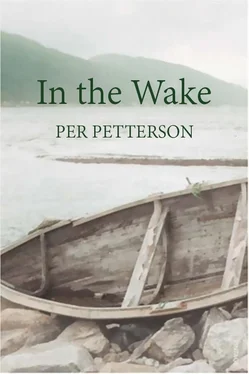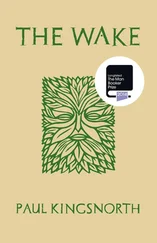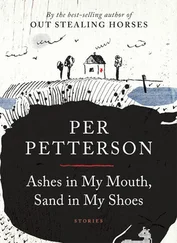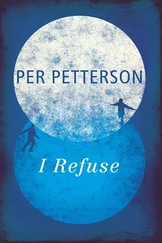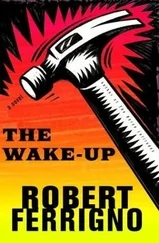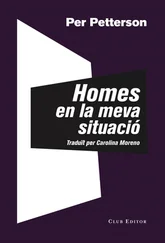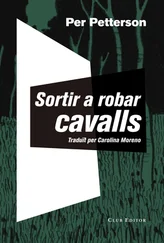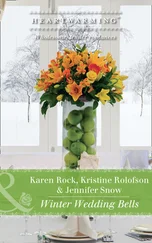There is a roundabout at the top. If I cross straight over it is sure to lead down on to the motorway again, so I turn to the right past a bus stop and on beside some garages by a housing block, and stop in the shelter of the far wall. I don’t know where I am, but that does not matter. I have the garage wall on one side and a container on the other. It feels suitably safe. It is warm in the car. I switch off the ignition and close my eyes, and there is mist everywhere. Mist everywhere and my father’s broad back and big lumps under my skis. It is like walking on snowshoes. Helge Ingstad wore snowshoes in the forests of Canada, but he had a dog team, and a sledge and beaver skins and he smoked a pipe in the pictures from the book A Fur Trapper’s Life . I have Splitkein skis and Kandahar bindings. Kandahar is a town in Afghanistan. Where Splitkein is, I do not know. Maybe nowhere. I raise my ski pole and lay it against my cheek like a gun with the ring at the end as a sight and let it slide round me and I see it all: tree behind tree behind tree and the track like a ribbon of shadow into the grey. Suddenly the snow on the nearest spruce breaks loose, slides down through the branches and plops on to the ground. I whip round and take aim, a squirrel in its greyish-brown fur streaks up the trunk and I fire before it reaches the top. A cone comes falling, yellow and heavy, and it sinks into the snow and vanishes, and I whisper: I could never kill anything.
But I can think about it. I could go hunting in the deep forest all winter long, inspect the traps at regular intervals and make friends with the Indians, count the furs in the spring, load up the sleigh in late March and dash off with well-rested dogs down to the Hudson Bay Company and get money in the bank.
He is far ahead on the track and he is calling me and wants to go on, but he is not really going anywhere. He gets up at five every morning, and sits alone in the kitchen having his breakfast while I lie upstairs awake and listening to the silence filling each cubic metre of air all the way upstairs, and he is not even listening to the radio. Then he fills his lunch box and leaves with a click of the door, and he is not going anywhere. He just goes on.
But you could say no. You could just leave everything and choose a different road.
“Come on,” he calls, “we’ll take a short cut.” He points with his pole in the direction of the track and makes two vigorous sweeps. “Watch out, it’s a steep slope here,” and he starts off downhill, knees bent low and his poles straight out from his armpits like two wings. I go over to the top where he stood before and watch him sail down the long hill like a great, blue-white bird, on his way going nowhere. I turn and see the main track we have left far away between two summits, it makes a bend into the forest, and there are people there, although I cannot hear their voices. When I look back my father has vanished. There are only the pine tree trunks and the long white hill and the misty air, and I do not know where I am and cannot turn back. I push off with my poles and almost sit right down on the heels of my boots and glide off. The track takes a long turn, and when I come round it a warm wind rises along the ridge. It’s a wicked wind, and the going is so slow that I stand up again and I see the white surface of a lake down below, and just by the lake behind a tree there’s a dark shadow. A dead animal, I think, a roe deer, but it is no animal. It is my father in the deep snow, his face resting against one shoulder and his poles straight out. I stop before reaching him. Something is wrong. His face is white and he moves his jaws as if chewing, there is gravel in his mouth and it crunches when he says: “Is that you, Arvid.”
“Yes.”
“Can you take my skis off?”
I do not want to, but I must. I take off my own skis and walk round him in the snow. Then I see his foot. It is sticking out the wrong way and isn’t like anything I have ever seen before. I bend down and pull hard on the buckle and he groans aloud. I stand up quickly and say:
“Shit, don’t do that,” and my father turns his face even closer to his shoulder, and in the white snow he seems a lot smaller. I bend down and pull again. His foot slides out, looking weird, and then I unfasten the other ski.
“Come here,” he says. His voice is stronger now. I take two steps and stand close to him, and he takes a hold round my hips and starts to hoist himself slowly up.
“Now you just stay there,” he says, and his body grows big again, and heavy and about to drag me down through the snow and deep into the ground. I plant my feet firmly and look another way, look out on the water where the ski track crosses to the other shore. No-one has been on it for a long time, the snow looks wet and hellish, and there is open water in two places.
He is standing up now, he leans on my shoulder, his knees are shaking, and he looks in the same direction as I do, saying: “I didn’t see it before it was too late, I just threw myself to the side, there was no time to turn.” And then there’s a scraping sound. Shivers run down my back as I realise my father is standing close to my ear grinding his teeth. I twist aside, and he starts to slide.
“Fucking hell,” he says, and his hands scrape over my sweater, over the zigzag pattern and down my stomach, he is pulling me with him, it is an avalanche with us both right inside the fall, and we land in the snow with him on top. I hit out and kick to free myself, his wet anorak against my face, I cannot breathe, it’s like drowning, I get frightened and scream:
“Let go of me,” and roll aside and get to my knees and then all the way up and I stand and breathe as best I can while my father groans again, clenches his teeth and lifts the damaged leg with both hands out from under his body. His forehead is wet and he looks at me as if I wasn’t his son at all and says: “It’s no good, Arvid. You must go for help.”
I look up the long hill. I could never do that, neither with nor without skis.
“You can go across to the main track,” he says, “there are people there.” He indicates the direction I must take and I look that way, but I don’t give a damn about people.
“I don’t want to,” I say, and I mean it.
“You must, I’m afraid,” my father says. That is not true, he is afraid of nothing, but he is right, I have to go. And anyway I don’t want to stay. I don’t want to go, and I cannot stay, so I just start to walk, without my skis, into the forest with the wet snow up to my ankles, and only once do I turn and see him sitting with his head against a tree, gazing into the air with his pale dripping wet forehead and his patriot’s hairstyle.
“You’ll be fine,” he says aloud, “you can do it,” and I can only just hear him and I feel the weight of his head right over to where I am standing, but he does not turn, and it does not matter what he says, because everything closes off behind me and I am alone.
I walk. Snow begins to fall, wet flakes down my neck, and I don’t know what time of day it is, and I am hungry, and maybe it will soon be evening and darkness will fall. I choose a tree far ahead and walk until I reach it, and then choose a new one and tell myself I can rest when that is behind me. But I do not stop, just pick out more trees until I cannot go on any further and sit down on a stump. The stump is next to a spruce with its branches weighed all the way down by snow to form a shelter only I can know. No-one can see me, all around is silence. Straight in front of me there is a round clearing all covered with snow. I lean against the trunk and look up through the branches thinking there might be a squirrel at the top. I don’t know how long I sit there. When I stand up and look out on the clearing I see a shadow first and then a huge elk moves alongside the trees opposite me. Its long legs move cautiously and it does not like the going, its whole body quivers nervously, and each time a hoof sinks into the snow it quickly comes up as if it was a dance. I feel the mild wind in my face and know I am well placed. It is my first elk, but I know it from the books of Mikkjel Fønhus, it is misshapen and beautiful, and heavy and light both, as it dances across the clearing like a creature from some other world and it will soon vanish among the trees on the opposite side. Calmly, I raise my hands and grip a gun I do not have, close one eye tight and aim with the other, and shout: “Bang.”
Читать дальше
